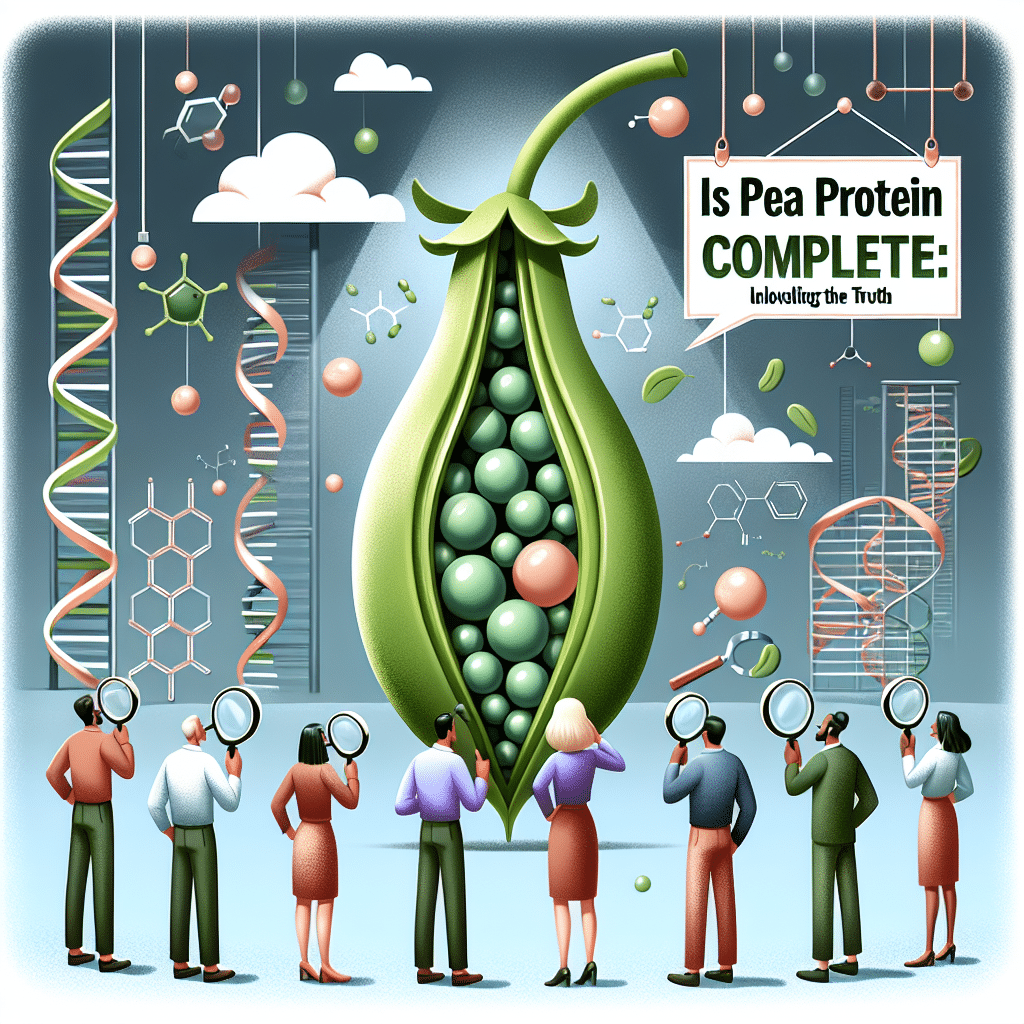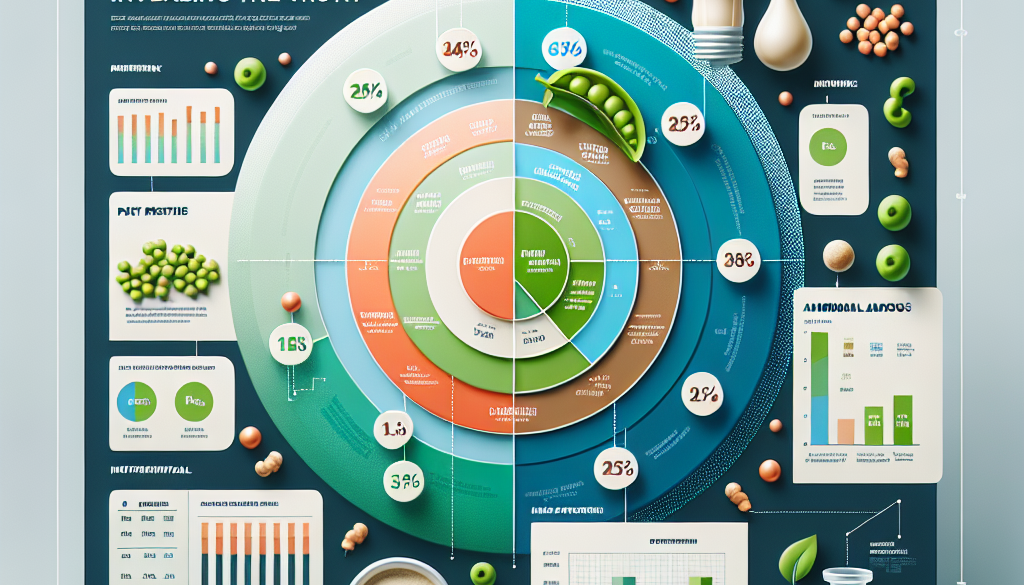Is Pea Protein Complete: Unveiling the Truth
-
Table of Contents
Is Pea Protein Complete: Unveiling the Truth

Pea protein has gained significant popularity in recent years as a plant-based alternative to animal-based protein sources. With the rise in veganism and the increasing demand for sustainable protein options, pea protein has emerged as a viable choice for individuals looking to meet their protein needs. However, there has been some debate surrounding the completeness of pea protein. In this article, we will delve into the topic and uncover the truth about whether pea protein is indeed complete.
Understanding Protein Completeness
Before we dive into the specifics of pea protein, it is essential to understand what protein completeness means. A complete protein is one that contains all nine essential amino acids that the body cannot produce on its own. These amino acids are crucial for various bodily functions, including muscle growth, repair, and overall health.
Traditionally, animal-based protein sources such as meat, eggs, and dairy products have been considered complete proteins as they contain all essential amino acids in the right proportions. However, with the rise of plant-based diets, individuals are now seeking alternative protein sources that can provide the same nutritional benefits.
The Amino Acid Profile of Pea Protein
Pea protein is derived from yellow split peas and is known for its high protein content. However, when it comes to protein completeness, pea protein falls short in one essential amino acid – methionine. Methionine is an amino acid that plays a vital role in various bodily functions, including metabolism and detoxification.
While pea protein is not considered a complete protein on its own, it can be easily complemented with other plant-based protein sources to create a complete amino acid profile. For example, combining pea protein with rice protein can provide all nine essential amino acids, making it a complete protein source.
Complementary Protein Sources
As mentioned earlier, combining pea protein with other plant-based protein sources can help create a complete amino acid profile. Here are some complementary protein sources that can be combined with pea protein:
- Rice Protein: Rice protein is another popular plant-based protein source that is low in lysine but high in methionine. Combining rice protein with pea protein can create a complete protein source.
- Hemp Protein: Hemp protein is rich in all essential amino acids, including methionine. Combining hemp protein with pea protein can enhance the protein completeness.
- Quinoa: Quinoa is a complete protein source on its own, containing all nine essential amino acids. Adding quinoa to pea protein can boost its protein completeness.
By incorporating these complementary protein sources into your diet, you can ensure that you are getting all the essential amino acids your body needs for optimal health.
The Benefits of Pea Protein
While pea protein may not be a complete protein on its own, it still offers numerous benefits that make it a valuable addition to any diet. Here are some of the benefits of pea protein:
- High Protein Content: Pea protein is known for its high protein content, making it an excellent choice for individuals looking to increase their protein intake.
- Easy Digestion: Pea protein is easily digestible, making it suitable for individuals with digestive issues or sensitivities to other protein sources.
- Rich in Branched-Chain Amino Acids (BCAAs): Pea protein is rich in BCAAs, which are essential for muscle growth, repair, and recovery.
- Sustainable and Environmentally Friendly: Pea protein is derived from yellow split peas, which require less water and produce fewer greenhouse gas emissions compared to animal-based protein sources.
These benefits make pea protein a viable option for individuals looking to meet their protein needs while also considering sustainability and environmental impact.
Conclusion
While pea protein may not be a complete protein on its own, it can be easily complemented with other plant-based protein sources to create a complete amino acid profile. By combining pea protein with sources such as rice protein, hemp protein, or quinoa, individuals can ensure that they are getting all the essential amino acids their body needs for optimal health.
Pea protein offers numerous benefits, including high protein content, easy digestion, and sustainability. It is a valuable addition to any diet, especially for individuals looking for plant-based protein options.
So, the next time you come across the question, “Is pea protein complete?” you can confidently answer that while it may not be complete on its own, it can be easily combined with other plant-based protein sources to create a complete amino acid profile.
About ETprotein
ETprotein, a reputable protein Chinese factory manufacturer and supplier, is renowned for producing, stocking, exporting, and delivering the highest quality organic bulk vegan protein and plant proteins. They include Organic rice protein, clear rice protein, pea protein, clear pea protein, pumpkin seed protein, sunflower seed protein, mung bean protein, etc. Our offerings, characterized by a neutral taste, non-GMO, allergen-free attributes, cater to a diverse range of industries. We serve nutraceutical, pharmaceutical, cosmeceutical, veterinary, as well as food and beverage finished product distributors, traders, and manufacturers across Europe, USA, Canada, Australia, Thailand, Japan, Korea, Brazil, and Chile, among others.
Our specialization includes exporting and delivering tailor-made protein powder and finished nutritional supplements. Our extensive product range covers sectors like Food and Beverage, Sports Nutrition, Weight Management, Dietary Supplements, Health and Wellness Products, and Infant Formula, ensuring comprehensive solutions to meet all your protein needs.
As a trusted company by leading global food and beverage brands and Fortune 500 companies, ETprotein reinforces China’s reputation in the global arena. For more information or to sample our products, please contact us and email sales(at)ETprotein.com today.












